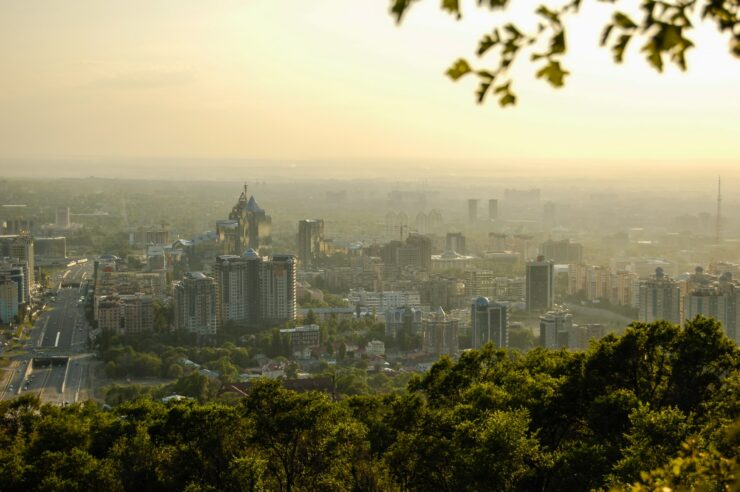UKRAINE
Sequoia’s Latest Research Touts Resilience of Ukraine’s IT Sector
Ukraine’s IT talent–85% of them–managed to keep working despite the war, according to research compiled by American VC firm Sequoia. While just 16% of Ukrainian tech companies lost more than 10% of their customers, 52% retained all of them. [Source: SequoiaVC]
Ukraine’s Government Offers Grants to Anti-Drone Developers
Nearly 50 IT companies took part in a second hackathon organized by the Ukraine’s Ministry of Digital Transformation, seeking fresh ideas of anti-drone solutions while the country is under attack by drones. Three winners will get $1 million each and sign contracts with the Ministry. The first hackathon had six winners. [Source: The Ministry of Digital Transformation]
Ukrainian NGO Calls on Developers for Better Air Intelligence
A non-government organization Aerorozvidka (Air Intelligence, Surveillance and Reconnaissance) is looking for volunteers or paid workers who are ready to spend at least 20 hours a week to help improve air intelligence technologies. Aerorozvidka is a community that contributes to the creation and implementation of network-centric and robotic military capabilities for the Security and Defense Forces of Ukraine. [Source: IT Ukraine Association]
Ukrainian Startups Drew Attention and Funding at London Tech Event
Eight Ukrainian companies reached preliminary agreements worth $8 million at London Tech Week. An official delegation of the Ministry of Digital Transformation also visited the event and held meetings with officials and investors, for example, the UK technical community and experts from the London Business School. [Source: The Ministry of Digital Transformation]
Ukraine Suspicious of Telegram
The Ukrainian cyber police told Ukrainians not to send sensitive information via Telegram messenger as data can be spied on by Russian special services over reports that Telegram’s creator Pavel Durov is linked to the Kremlin. They are recommending Signal or WhatsApp messaging services instead. [Source: Dou.ua]
KAZAKHSTAN
Kazakhstan Bets on Renewables
Kazakhstan wants to increase the share of renewable energy sources to 15% of all energy generated by 2030 versus 4.5% at the moment. In the first quarter of 2023, renewables produced electric energy 59% more than in the corresponding period of 2022. [Sources: Kapital.kz, Kapital.kz]
First Internet Transcaspian Line to Be Built
Kazakhtelecom and AzerTelecom, two major state-run telecommunications moguls in Kazakhstan and Azerbaijan consecutively, agreed to establish a joint venture to build a Transcaspian fiber optic line. The line will be a part of the Digital Silk Way project that aims to boost Internet connection between Europe and Asia and secure and speed up data transfer. [Source: Profit.kz]
State Support Became Possible for Private Creative Companies
The government of Kazakhstan adopted a register of “creative industries” that includes IT, fashion, architecture, music, cinema, photography, etc. The creation of the register and criteria to be listed allows for companies from these industries to get state support. [Source: Kapital.kz]
BALTICS
The European Commission to Fund Estonian Defense Tech
Eight Estonian startups and five Estonian technological companies will be funded by the European Commission to advance defense research and development amid growing military threats. The scope of the ideas that will be financed includes unmanned ground vehicles, robotics warfare solutions, cellular drones with a 4G/5G communication module, cybersecurity, communication solutions for nano-satellites and so on. [Source: BalticVC]
Baltic Startups See Growth in Turnover Despite Challenges
Startups in the Baltic countries expect their turnover to increase by more than 15% this year, though they are facing high energy prices, rising inflation, and an increasing tax burden, a new survey showed. The same survey said that the number of startups in the countries rose over recent years: in Estonia by 26% from 2016 to 2021, in Lithuania by 40%, and in Latvia by 23% during the same period. [Source: BalticVC]
Estonian E-Bikes Maker Drew Money for Expansion
Tallinn-based startup Vok Bikes that produces electric bikes for last-mile delivery service raised $4.1 million from a number of investors. The investments will be spent on the creation of a new bike with a payload of up to 200 kg versus the existing models of up to 120 kg and entering other European cities’ markets in 2024. [Source: BalticVC]
Lithuania to Boost Business Digitalization
Lithuania’s government will allocate $16 million for grants for startups in the fields of blockchain, artificial intelligence (AI), robotics process automation that aim at enhancing the level of business processes digitalization. Startups from the country’s capital of Vilnius can apply for grants till the end of this year. [Source: BalticVC]
GEORGIA
Tether to Contribute to Georgian Crypto Scene
The government of Georgia and the emitent of stablecoin Tether signed a memorandum of understanding on the implementation of crypto innovations in the country and the development of blockchain technology. “Through close collaboration with the Government of Georgia, Tether aims to create a flourishing environment for peer-to-peer technology usage,” said Paolo Ardoino, CTO of Tether. [Source: Tether]
Georgian President Opposes Russian Investors
The President of Georgia Salome Zourabichvili called to strengthen the oversight over Russian investors. She also added that she refuses requests of such investors of Georgian citizenship if they don’t have Georgian ancestors. [Source: RBC]
UZBEKISTAN
Uzbekistan Experiencing Boom in E-Cars
The number of electric cars imported in Uzbekistan during the first five months of 2023 was 3816, four times higher year-on-year, worth $120 million. The biggest share of the cars were from China followed by Hong Kong, Germany, UAE, South Korea, and USA. [Source: Spot.uz]
Uzbekistan to Deregulate Air Space
Private companies will start management of six airports in Uzbekistan over the next few years. All the airports in the country will start operations within the Open Skies regulation which assumes that any airline can operate on routes between any two countries regardless of the country of its origin. [Source: Spot.uz]
RUSSIAN COMPANIES ABROAD
Yandex Launches Self-Driving Cars in Serbia
A subsidiary of a Russian Internet giant Yandex, the Self-Driving Group company, started testing of unmanned cars in Belgrade, the capital of Serbia, following the start of such tests in a district in the Russian capital Moscow. The Self-Driving Group will soon be separated from Yandex after the restructuring of the corporation. [Source: TASS]
Russian Startup to Establish AI-Based Vertical Farms in Indonesia
Russian AgroTech startup Greenbar signed an agreement with Indonesian company PT Agung Anugrah Investama on the creation of a network of 15,000 vertical farms in grocery stores throughout the country. Greenbar uses artificial intelligence to manage usage of soil, sunlight, fertilizers to get the best farming results. [Source: RB]






Add comment